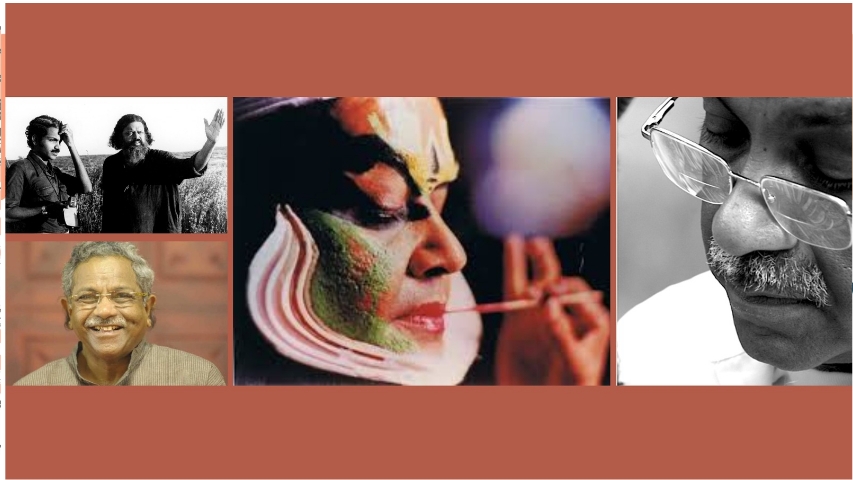
ALTERNATIVE ENTERTAINMENT: THE GENTLE GENIUS
by Khalid Mohamed April 30 2025, 12:00 am Estimated Reading Time: 5 mins, 23 secsCinema, at its purest and most soul-stirring, found a devoted servant in Shaji N. Karun. Khalid Mohamed bids farewell to the globally-lauded but always self-effacing cinematographer-director, Shaji N. Karun, who passed away on April 28 2025.
Cinema, at its most soul-stirring and poetic, found a master in Shaji N. Karun, the globally-acclaimed yet self-effacing cinematographer and director whose visual storytelling transcended language and borders. His works, imbued with lyrical imagery, humanism, and a deep understanding of emotional truth, garnered accolades from Cannes, Locarno, and Kerala’s film fraternity, yet he remained grounded in his passion for art cinema and cultural authenticity. As we bid farewell to this visionary filmmaker, we honour a legacy where light, shadow, and the unspoken formed the truest language of the screen.
Driving a dinky little Fiat, Shaji Neelakanthan Karnukaran, away from the killing heat of Trivandrum to the comparative cool of a café at Kovalam beach, he was strangely wearing a navy blue blazer. Laughing almost inaudibly, as he always did, he said, “I have to be a bit formal with you today.”

Shaji Neelakanthan Karnukaran
Better known as Shaji N. Karun, the cinematographer-cum-director was humility personified after having snagged a record number of national, state, and international awards including the Cannes d’Or. Among others were top honours at Locarno, Edinburgh, Fribourg, Chicago, Hawaii, besides the Golden Lotus National Award for Best Feature Film, and as Best Director for Piravi (The Birth, Malayalam, 1989).
The blazer, he explained, was because he wanted to look ‘professional’. On reaching the café, he cleared his throat and stammered, “Would you be interested in a collaboration with me? I want you to write a script for me in Hindi, nothing commercial but on the lines of Mammo you wrote for Shyam Benegal sir.”
Normally that wasn’t an offer one could refuse. I had known him ever since he was a cinematographer on his mentor G. Aravindan’s masterworks Kanchana Sita, Thampu, Kummatty, Esthappan and Pokkuveyil. The ravishing, inventively conceptualized photography was entirely in rhythm with the director’s poetic aesthetic.
Yet it could be sensed that Shaji was now raring to go solo as a director himself. Surprisingly, neither Shaji nor Aravindan spoke of each other at length on any forum in keeping with their taciturn, shy personalities. Or they might have had their creative differences after a point. But let’s not get into hypothetical conjectures.
That Shaji longed to enter the Hindi film industry, in a major or minor way, was evident. He had photographed an adaptation of Rajinder Singh Bedi’s classic Hindi novel Ek Chaddar Maili Si (1986) directed by Sukhwant Dhadda, a long-time friend from their years at the Film Institute of India, Pune. The film, located in the villages of Punjab and Himachal Pradesh, lensed evocatively mostly in natural lighting and in muted colours, despite being headlined by top B-town actors Hema Malini, Rishi Kapoor, and Poonam Dhillon, was marketed indifferently and tanked at the cash counters.
A tricky proposition
A-sweat, Shaji took off his blazer and asked again over sweet lemonades, “Would you do the script please? I’m thinking of approaching Jaya Bachchan for the lead role. And I’ve brought Rs 1 lakh as an advance payment for you.”
This was getting into a slippery zone. Aware that I couldn’t possibly match a script of the strength and spleen of Piravi, I had to decline politely. The multi-award grabber was inspired by a true story known as the Rajan case: A young man had been arrested for participating in a protest morcha during the days of the Emergency. Days and years elapsed but the youth’s aged father (memorably portrayed by Premji) would return every late evening to a small town’s bus-stop in the hope that his son would return in the last bus by some sleight of magic. It was more than likely that the arrested boy had perished in jail because of police brutality. Laceratingly humane, here was a dramaturgy that was rigidly uncompromised, politically volatile, and had moved global audiences to tears.
“I understand why you are hesitant,” my host smiled generously. “Trouble is that now everyone wants me to make another Piravi… which is like a new Sholay expected from Ramesh Sippy. I thought we could do something different but it’s okay. Don’t ever get upset with me.”
Unfulfilled dreams
That was the quintessential Shaji N. Karun, always apologetic, never pushy. As it happened later he did announce a Malayalam film based on Kaadal, a short story by T. Padmanabhan—featuring Jaya Bachchan and Mohanlal but as suddenly shelved the project.
Next, there was the news that he would be helming a film, produced by Bobby Bedi, on the legendary painter Raja Ravi Varma during the period when he had painted the iconic portraits of goddesses Saraswati and Lakshmi. The model who posed for the painter was a Marathi woman, and the actress who came to the filmmaker's mind was Madhuri Dixit or Vidya Balan. Unfortunately, this project didn’t fructify either and was made by Ketan Mehta.
Not the sort to procrastinate for long, Shaji helmed a row of significant Malayalam films Swaham (1994), Vanaprastham (1999), and Kutty Srank (2009). They did fetch him the inevitable awards and laurels but there was a restlessness within the frames – his work showed up flaws but dispensable ones.
Revered in Kerala unflinchingly, he was appointed the first chairman of the Kerala State Chalchitra Academy and was executive chairman of the International Film Festival of Kerala from 1998 to 2001, and chairman of the Kerala State Film Development Corporation from 2022 to 2024. Increasingly he was becoming a ‘committee person’. I’d like to think that didn’t hamper the output of his oeuvre.
Farewell to a gentle genius
That he was suffering from a terminal illness and has left us at the age of 73 was a shocker. It’s a crying shame that he couldn’t achieve that repressed, never aggressive desire – dream? – of making a film which would have perhaps given him a wider Pan-Asian audience.
Today I see him in his navy blue blazer at the Kovalam beach – cinema coursed gently through Shaji N. Karun’s veins. Farewell sir, the taste of the sweet lemonade will linger forever.






-173X130.jpg)
-173X130.jpg)

-173X130.jpg)
-173X130.jpg)
-173X130.jpg)
-173X130.jpg)
-173X130.jpg)